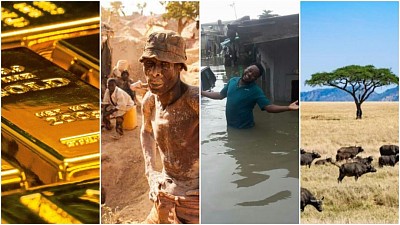Blog
Mastering the art of pretence: FAKE TRUTHSource: Blessing
Pretence, or the act of pretending, can be a useful tool in certain situations, such as when trying to avoid confrontation or protect oneself from harm. However, when pretence is used to intentionally deceive others, it becomes problematic and can lead to harmful outcomes.
The concept of "fake truth" refers to information that is presented as true, but is actually false. This can take many forms, such as fake news, propaganda, or outright lies. In today's digital age, it has become increasingly easy to spread fake truth through social media and other online platforms, which can have serious consequences for individuals, organizations, and even entire societies at large. This needs to be put in check.
There are contexts where the art of pretence can be harmful and unethical and can also be beneficial. For example, politicians may pretend to have certain beliefs or values in order to win votes, even if those beliefs or values are not genuine. Similarly, individuals may lie or deceive others in order to gain power or manipulate situations to their advantage. This art of pretence is considered harmful and unethical.
Example of a beneficial pretence is in the world of acting, where actors and actresses must convincingly portray characters who are different from themselves. This kind of pretence is limited as it is in the view of passing a message to the viewers.
To master the art of pretence and fake truth, one must be skilled at manipulating others' perceptions and beliefs. This requires a deep understanding of human psychology, as well as the ability to create convincing narratives that appeal to people's emotions and biases. There are negative psychological consequences for individuals who engage in it. Constantly pretending to be something that one is not can lead to feelings of stress, anxiety, and even depression. It can also create a sense of disconnection from one's authentic self, which can be damaging to one's overall sense of well-being.
Overall, while the art of pretence can have some positive applications, it is important to approach it with caution and to be mindful of the potential risks and ethical considerations involved. It is always preferable to strive for honesty and authenticity in one's actions and interactions with others.
One of the key issues with the art of pretence as I draw an end to this topic is that, it can be difficult to distinguish between genuine truth and false pretences. In many cases, it may be impossible to know whether someone is truly sincere in their beliefs or actions, or whether they are simply pretending in order to achieve a certain outcome. This can create confusion in the midst of people around you. Virtues and trust of oneself begins to fade gradually without knowing.
The pursuit of fake truth is ultimately a destructive and unethical endeavor. It undermines the trust and integrity that are essential to healthy relationships, institutions, and societies. What should be done instead is, we should strive for transparency, honesty, and accountability in all our interactions be it privately or publicly, and work to build a culture that values truth and accuracy above all else. Which is highly needed as we live in a world where falsehood is applaud.
SAY NO TO PRETENCE!
BOOK OF THE MONTH
Principles by Ray Dialo⭐
Principles -Ray Dalio
6 nuggets from Principles by Ray Dalio.
Principles are ways of successfully dealing with reality to get what you want out of life.
Send Comments and Reviews
What can the world learn from Africa? A huge amount. Here’s just 9 things:
1. That mineral wealth and natural beauty do not equal prosperity
Africa as a continent probably has more mineral wealth, natural beauty and resources than any other continent. Most of the world’s diamonds, gold and platinum. The world’s most amazing wildlife destinations. Massive oil and gas reserves. And yet it is the poorest continent in the world. Partly due to years of exploitation and colonisation, other people and empires taking from Africa without putting much back. Raping and robbing the continent for their own gain. And partly due to years of mismanagement, poor government, corrupt leadership and bad education.
2. That lack of prosperity does not equal unhappiness
Africa is full of happy, beautiful, amazing people. To quote Ernest Hemingway: “I never knew of a morning in Africa when I woke up and was not happy.” Yes, there are problems in Africa. But we love life. We love to sing and dance. Some of our wedding feasts last 7 days. We sing while we work. I’ve traveled around the world, and Africa has some of the most friendly and happy people on the planet.
3. That hard work alone does not make you rich
Nobody works harder than Africa’s manual laborers, mine workers, mothers carrying firewood and water every day to cook food for their family. Hard work is important, but so is education, and opportunities, and infrastructure.
4. That it takes a village to raise someone.
The west is focused very much on individual success, individual rights, looking after yourself first. In Africa, there is a much stronger sense of community. Extended families are huge, and often help each other. Sometimes, there is one breadwinner supporting up to 10 or 15 people. Caring for the elderly is up to the adult children. You don’t leave your elderly parents in the lurch. Aunts and grannies help raise the kids, while men go and search for work. Of course, it doesn’t always turn out well. Children need fathers in their lives. But the sense of community is strong. Life is not all about you.
5. That we are who we are because of other people.
In South Africa, this is called Ubuntu. Human kindness, and human interdependence. The opposite of selfishness. We need each other, and we are there for each other. Hardship often brings people closer together. In Africa, you will find an amazing willingness to help strangers, to sacrifice for others, to think of others first. It’s one of the most inspiring African values. We even have a popular Linux operating system named Ubuntu. This is definitely something the rest of the world can learn from, especially western, individualistic societies.
6. That power without checks and balances corrupts people and ruins nations.
Sadly, Africa has had more than its share of power-hungry dictators and despots. In many countries, sudden decolonization and independence after years of exploitation often left a vacuum that was filled either by puppet regimes, or by opportunistic dictators in waiting. Coups have overthrown many a moderate government and replaced them with military dictatorships. Without strong democratic institutions, separation of powers, independent judiciary, a solid constitution and fair electoral system, and other checks and balances, the greedy and power-hungry politicians who sometimes take control of African governments have been the downfall of these countries. Like the pigs ruling George’s Orwell’s Animal Farm, they become self-serving instead of serving and building their nation. There are exceptions of course. But many failed states in Africa are a lesson on how not to run a country.
7. How to succeed in the face of hardship.
Africa is full of amazing success stories. Creative people who succeed against all odds. Entrepreneurs who have the resilience, fortitude and creativity to build a prospering business in a tough environment, with limited resources, high risks and a volatile market. It’s not easy to make money in Africa. And yet where others would have given up, many people are doing an amazing job with a terrible starting hand and no chips in front of them.
8. That government is not the answer to everything.
People are amazing. Good people step up where governments fall short. In every African country, the amount of work done by non-governmental and non-profit organisations is astounding. Many countries would ground to a halt if all these NGO’s suddenly stopped operating hospitals, nursing homes, orphanages, schools, community centers and other development projects. They rely entirely on the goodwill of people, donations and volunteers. They support government and fill up the gaps where government service is lacking or absent. The amount and value of work done by volunteers, private individuals and non-profit organizations is truly astounding.
9. That God made an amazingly beautiful world.
If you’re stuck in a grey and boring city, come to Africa. If you want to see the beauty of creation, wildlife, scenery, people, waterfalls, stunning coastlines, come to Africa. The beauty of Africa far outweighs the problems, crime, poverty and hardship. The people are friendly and welcoming. The wildlife is amazing. You will want to visit again and again. Ask anyone who has been to Africa. But be warned - you can leave Africa, but Africa will never leave you!
Thanks for reading.
by Onne vegter, entrepreneur and writer.




